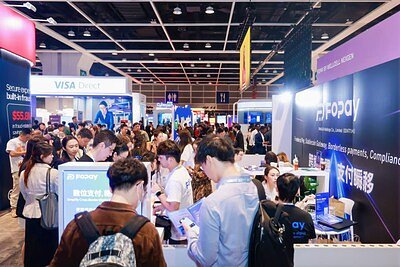
Stablecoins Seek Foothold: Fopay Launches Cross-Border Payment Platform at Hong Kong FinTech Week
Hong Kong's FinTech ambitions get a boost as Fopay unveils a stablecoin-powered payment platform aiming to disrupt traditional cross-border remittances. But can this new technology overcome regulatory hurdles and build trust?
Stablecoins Seek Foothold: Fopay Launches Cross-Border Payment Platform at Hong Kong FinTech Week
HONG KONG – Amidst the bustling halls of Hong Kong FinTech Week 2025, a new player emerged seeking to redefine the landscape of cross-border payments: Fopay, a global stablecoin payment platform developed by WellCell Holdings Co., Limited. The company's debut, featuring innovative remittance solutions, custody services, and a limited rollout of QR code payments in Brazil, signals a growing push to leverage blockchain technology for more efficient and accessible international financial transactions.
With over 37,000 attendees and a vibrant atmosphere, Hong Kong FinTech Week provided a fertile ground for Fopay to showcase its vision. The company’s booth proved popular, offering interactive demos of its platform and boasting a range of giveaways, demonstrating a keen understanding of user experience and brand engagement. But beyond the promotional flair, Fopay’s entry into a crowded market raises critical questions about the future of international finance and the role of stablecoins in bridging the gap between traditional systems and the digital economy.
The Promise of Stablecoin Remittances
For decades, the traditional remittance industry has been characterized by high fees, slow processing times, and limited access, particularly for those sending money to developing countries. Fopay, like other stablecoin-based platforms, aims to address these shortcomings. By utilizing a stablecoin – a cryptocurrency designed to maintain a stable value pegged to a fiat currency or other asset – the company promises near-instantaneous transactions at significantly lower costs.
“The potential for stablecoins to disrupt the remittance market is immense,” says a financial analyst familiar with the technology. “Reducing friction and lowering costs can unlock significant economic benefits for individuals and families relying on these funds.”
Fopay’s platform offers cross-border remittance services utilizing a stablecoin, custody services to safeguard digital assets, and, in a limited pilot program, QR code payments in Brazil. This phased rollout indicates a strategic approach to expansion, focusing initially on markets where regulatory frameworks are more accommodating and demand for efficient payment solutions is high.
Navigating the Regulatory Landscape
However, the path forward for stablecoin adoption is not without obstacles. Regulatory uncertainty remains a significant hurdle. While Hong Kong has shown a willingness to embrace fintech innovation, the legal framework surrounding stablecoins remains underdeveloped. The Hong Kong Monetary Authority (HKMA) is currently exploring potential regulatory approaches, but clear guidelines are still needed to ensure consumer protection and financial stability.
“Regulators are walking a tightrope,” explains a policy expert specializing in digital finance. “They need to foster innovation while mitigating risks associated with stablecoins, such as money laundering and systemic instability.”
Beyond Hong Kong, Fopay plans to expand its operations across Asia, Southeast Asia, and Europe. Navigating the diverse regulatory landscapes in these regions will be a key challenge. Each jurisdiction has its own unique requirements for licensing, compliance, and consumer protection, requiring Fopay to adapt its strategies accordingly.
Building Trust in a Volatile Market
Beyond regulation, building trust is paramount. The cryptocurrency market is notorious for its volatility, and concerns about the security and reliability of digital assets persist. Fopay must demonstrate a robust infrastructure, stringent security measures, and a commitment to transparency to earn the confidence of users and financial institutions.
“Users need to be assured that their funds are safe and that transactions will be processed reliably,” says a technology consultant specializing in blockchain solutions. “This requires a combination of technological innovation, operational excellence, and a strong commitment to security.”
Furthermore, the backing of the stablecoin itself is crucial. The stability of the coin relies on the assets that support it. Full transparency regarding the reserve assets and regular audits are essential to maintain trust and prevent potential issues arising from a lack of adequate backing.
A Wider Trend: Hong Kong’s Fintech Ambitions
Fopay’s launch is also indicative of Hong Kong’s broader ambition to establish itself as a leading global fintech hub. The city has actively courted fintech companies with favorable policies, regulatory sandboxes, and a vibrant ecosystem of investors and entrepreneurs.
“Hong Kong recognizes the transformative potential of fintech and is committed to creating an environment that fosters innovation and attracts investment,” says a representative from InvestHK, the city’s investment promotion agency.
However, Hong Kong faces competition from other fintech hubs around the world, including Singapore, London, and New York. To maintain its competitive edge, the city must continue to invest in infrastructure, talent development, and regulatory clarity.
The Road Ahead
Fopay’s debut at Hong Kong FinTech Week represents a significant step towards realizing the potential of stablecoins in cross-border payments. While challenges remain, the company’s commitment to innovation, user experience, and compliance positions it as a key player in the evolving landscape of international finance. The success of Fopay, and other similar platforms, will depend on their ability to navigate the regulatory hurdles, build trust with users, and demonstrate the tangible benefits of stablecoin-powered payments. As the technology matures and regulatory frameworks become clearer, stablecoins have the potential to reshape the future of global finance, making international transactions more efficient, accessible, and inclusive.
